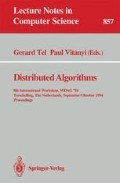Abstract
We consider the hierarchy of wait-free shared objects, and show that this hierarchy does not express the computational power of shared objects. We prove that there are objects that are classified high in the hierarchy, yet, they can not implement objects that are classified much lower in the hierarchy. Our main result is: for any two levels k 1≥k 2 in the hierarchy, there are shared objects X 1 and X 2 that belong to k 1 and k 2, respectively, such that X 1 can not implement X 2. (We allow the specifications of the shared objects to be non deterministic.) This result implies not only that the current definition of the wait-free hierarchy does not express the computational power of shared objects, but also that there is no other hierarchy that does.
Preview
Unable to display preview. Download preview PDF.
References
Y. Afek and G. Stupp, “Synchronization Power Depends on the Register Size,” the 34th Annual IEEE Conference on Foundations of Computer Science, November 1993.
Y. Afek, E. Weisberger and H. Weisman, “A Completeness Theorem for a Class of Synchronization Objects,” the 12th ACM Symposium on Principles of Distributed Computing, August 1993, pp. 159–170.
J. Aspnes and M. P. Herlihy, “Wait-Free Data Structures in the Asynchronous PRAM Model,” proceedings of the 2nd Annual Symposium on Parallel Algorithms and Architectures, 1990, pp. 340–349.
H. Attiya, N. A. Lynch and N. Shavit, “Are wait-free algorithms fast?” proceedings of the 31st IEEE Symposium on Foundations of Computer Science 1990, pp. 55–64.
E. Borowsky, E. Gafni, “Generalized FLP Impossibility Result for t-resilient Asynchronous Computations,” Proceedings of the 25th Annual ACM Symposium on Theory of Computing, 1993.
E. Borowsky, E. Gafni, Y. Afek “Consensus Power Makes (Some) Sense!,” to appear in the proceedings of the 13th ACM Symposium on Principles of Distributed Computing, 1994.
S. Chaudhuri, “Agreement is Harder Than Consensus: Set Consensus Problems in Totally Asynchronous Systems,” proceedings of the 9th ACM Symposium on Principles of Distributed Computing, August 1990, pp. 311–324.
B. Chor, A. Israeli, and M. Li, On processor coordination using asynchronous hardware, Proc. of the 6th ACM Symp. on Principles of Distributed Computing, August 1987, pp. 86–97.
R. Cory, S. Moran, “Exotic Behavior of Consensus Numbers,” to appear in the proceedings of the 8th International Workshop on Distributed Algorithms, 1994.
M. Fischer, N. A. Lynch and M. S. Peterson, Impossibility of distributed commit with one faulty process, Journal of ACM, 32(2), April 1985, pp. 374–382.
M. P. Herlihy, “Wait-free synchronization,” ACM Transactions on Programming Languages and Systems, Vol. 13, No. 1 (Jan. 1991), pp. 124–149.
M. P. Herlihy and N. Shavit, “The Asynchronous Computability Theorem for t-resilient Tasks,” Proceedings of the 25th Annual ACM Symposium on Theory of Computing, 1993.
P. Jayanti, “On the Robustness of Herlihy's Hierarchy,” Proc. of the 12th ACM Symp. on Principles of Distributed Computing, August 1993, pp. 145–158.
J. M. Kleinberg and S. Mullainathan, “Resource Bounds and Combinations of Consensus Objects,” Proc. of the 12th ACM Symp. on Principles of Distributed Computing, August 1993, pp. 133–144.
G. Neiger, “Set-Linearizability and Obliviousness: Foundations of the Study of Asynchronous Computability,” to appear in the proceedings of the 13th ACM Symposium on Principles of Distributed Computing, 1994.
G. L. Peterson, R. A. Bazzi, G. Neiger, “A Gap Theorem for Consensus Types,” to appear in the proceedings of the 13th ACM Symposium on Principles of Distributed Computing, 1994.
M. Saks, F. Zaharoglou, “Wait-Free k-set Agreement is Impossible: The Topology of Public Knowledge,” Proceedings of the 25th Annual ACM Symposium on Theory of Computing, 1993.
Author information
Authors and Affiliations
Editor information
Rights and permissions
Copyright information
© 1994 Springer-Verlag Berlin Heidelberg
About this paper
Cite this paper
Rachman, O. (1994). Anomalies in the wait-free hierarchy. In: Tel, G., Vitányi, P. (eds) Distributed Algorithms. WDAG 1994. Lecture Notes in Computer Science, vol 857. Springer, Berlin, Heidelberg. https://doi.org/10.1007/BFb0020431
Download citation
DOI: https://doi.org/10.1007/BFb0020431
Published:
Publisher Name: Springer, Berlin, Heidelberg
Print ISBN: 978-3-540-58449-0
Online ISBN: 978-3-540-48799-9
eBook Packages: Springer Book Archive

